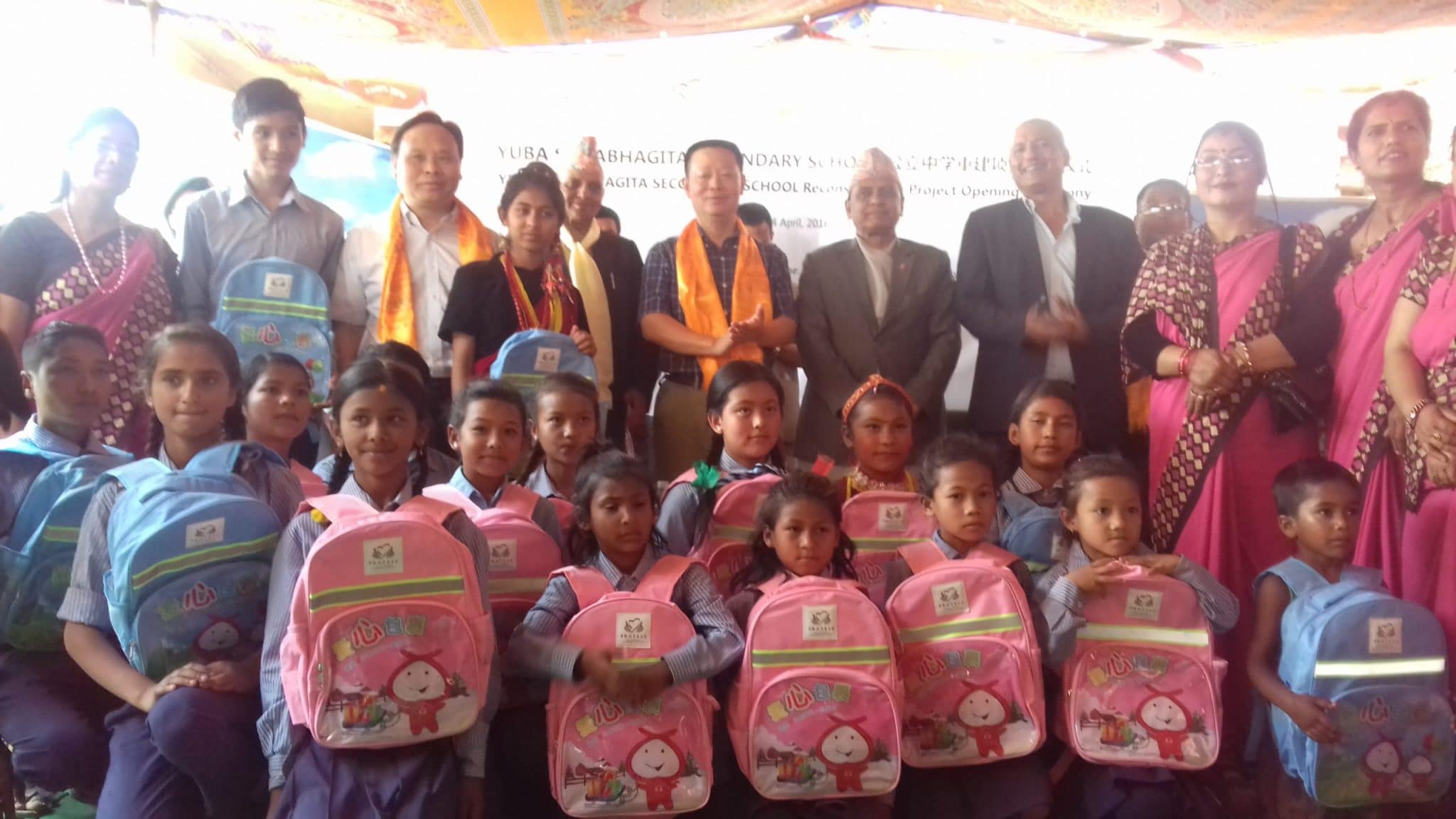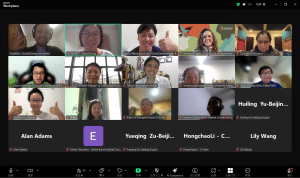
Editor’s Note:
In the context of growing calls for the charity sector to move in step with the One Belt, One Road initiative, China Development Brief (CDB) recently spoke with Mr.Wang Xingzui, the Executive Vice President of the China Foundation for Poverty Alleviation (CFPA) on why and how Chinese NGOs are heading abroad.
Wang Xingzui (hereinafter WXZ) is the Executive Vice President of CFPA and was selected as a Yale World Fellow in 2013.
CDB: In recent years, more and more Chinese NGOs and foundations have become active abroad. Do you think this trend will intensify?
WXZ: As the breadth and depth of China’s exchanges with the world deepen, more and more Chinese NGOs will go abroad. This trend will definitely intensify. I believe this will have a positive influence on the development of Chinese NGOs. On the one hand, when Chinese NGOs go abroad to take on international social responsibility, they embody the image of Chinese people as global citizens and of China as a responsible global power in the eyes of the world; on the other, Chinese NGOs abroad go through a process of learning how to integrate into the international community. We must study and understand international rules and discourse, understand developing countries, and, through our collaboration with the international community, improve our abilities and further our own personal development while helping developing countries.
CDB: Many people might wonder: why do Chinese NGOs want to address problems abroad, when China still has many domestic welfare issues that need attention and social problems waiting for solutions?
WXZ: We believe that in light of China’s continued economic growth, with its GDP now the world’s second largest, as well as the government’s promotion of the “One Belt, One Road” strategy, it is correct for Chinese NGOs to go abroad, since it serves the humanitarian spirit and the interests of national development. From an economic perspective, the breadth and depth of China’s exchanges with the world are rapidly expanding. According to Ministry of Commerce statistics, by the end of 2014, approximately 30,000 companies across 184 countries and territories worldwide had been established through Chinese foreign direct investment (FDI). China’s cumulative outbound FDI reached a net total of USD 882.6 billion. Looking at consumption, outbound overseas tourism is increasing day by day. According to National Tourism Bureau statistics, the number of overseas trips taken by Chinese citizens was over 120 million in 2016. In terms of aid, foreign aid is an important component of China’s foreign relations work. As China has increased the speed of its own development, it has always provided whatever aid it could to economically weak developing countries and taken on relevant international responsibilities.
CDB: Has the CFPA encountered any difficulties or barriers when carrying out projects overseas as a result of differences in cultural, political and social systems?
WXZ: When CFPA first began carrying out humanitarian and development aid programs, there were certainly some misunderstandings and delays as a result of not understanding the legal systems and the customs of receiving countries. It was a learning experience. (Wu Peng, director of CFPA’s international program recounts some of these learning experience here.) As our experience of working abroad accumulated, however, we were able to prevent these difficulties and barriers from arising in advance. We continually draw conclusions from the lessons learned during our experience abroad. In 2014, with financial support from the Asia Foundation, we edited the “Handbook for Chinese NGOs Going Abroad”, which summarized past experiences and provided relevant suggestions in five areas, namely, the feasibility of NGOs going abroad, building relationships, day-to-day operations, raising resources and project management.
CDB: What are the strengths of Chinese NGOs? What contributions do you see that Chinese NGOs’ going out can make to domestic and international civil society?
WXZ: We believe the main strengths of Chinese NGOs going abroad are as follows: first, Chinese NGOs are particularly well suited to supporting the foreign aid programs of the Chinese government, as well as the CSR programs of Chinese companies as a result of their four unique characteristics, namely, their professionalism, neutrality, innovativeness and ability to penetrate communities. Second, because China has a similar developmental background to developing countries, Chinese NGOs are better able to empathize with local populations in those countries and design programs tailored to their needs, thereby more effectively supporting local development. Third, China’s internet technology has developed rapidly and Chinese NGOs are among the global leaders when it comes to their technical experience with online fundraising. They can share this experience internationally and promote the development of international civil society.
CDB: Could you briefly introduce what the CFPA has done in terms of “going out” and what its achievements have been to date?
WXZ: Since 2005, the CFPA has been continually active in international humanitarian and development aid. By the end of 2016, we contributed a total of RMB 112 million in financial and material assets to international aid projects in 16 countries and territories. Currently, we have initiated long-term aid programs in Ethiopia, Sudan, Nepal and Myanmar, successfully registering offices in Nepal and Myanmar on July 27th and August 13th 2015, respectively.
In the area of international humanitarian aid, we have successively initiated aid work in 16 countries and territories, including Indonesia, Pakistan, Myanmar, Chile, Haiti, Japan, the horn of Africa, Ebola-affected regions in West Africa, Nepal and Ecuador. Especially after the 2015 Nepal earthquake and the earthquake in Ecuador this year, where my organization immediately sent in aid teams to visit the affected areas and provide relief, we received widespread praise from the host country and the international community. Currently, my organization is still present in Nepal in order to establish an office and engage in post-disaster reconstruction.
In the area of international development aid, we have successively implemented the Abu Ushar Friendship Hospital project and the Mother-Infant Protection Network demonstration project in Sudan, the Smiling Children project in Ethiopia and Sudan, as well as the Myanmar Pauk-Phaw university student aid program. Because the Abu Ushar Friendship Hospital, completed in 2011, was made possible by the united efforts of the government, companies and NGOs, it was named a “Public Foreign Relations Model Project” that year by the Ministry of Foreign Affairs. The Smiling Children school meal provision program launched by my organization in 2015, currently provides free meals to nearly 7000 poverty-affected students through 49 schools in two countries. The Myanmar Pauk-Phaw student aid project, which has funded 700 students affected by poverty, was launched at Yangon University on August 5th, 2016, an event which received considerable attention in Myanmar, with over 30 local media organizations reporting.
In terms of advocacy on globalization, we compiled reports such as “China’s International Social Responsibility Research Series”, as well as the “Handbook for Chinese NGOs Going Abroad”. We have also organized the “Civil Society Forum on International Social Responsibility”, the “Africa Charity Forum”, the “Seminar on the internationalization of Chinese Charity Organizations” and the “Love No Borders Salon”.
CDB: There is a significant difference between the work norms and standards followed in China and in many other countries, including in the area of civil society and humanitarian work. Do you think that when they “go out”, Chinese NGOs will have to adapt to the “international” norms and standards, or do they use the “Chinese model” to carry out their work and influence how things are done in rest of the world?
WXZ: Since Chinese NGOs are still in the early stages of going abroad, they are not yet familiar with the rules related to NGOs’ participation in the global community. When starting out, humanitarian aid organizations initially follow a Chinese work model, which often results in some redundancy and detours. As our experience in international humanitarian work increases, Chinese NGOs will join the network of the United Nations’ Office for the Coordination of Humanitarian Affairs, seeking cooperation and adhering to the international standards for humanitarian relief work. International development aid is a little bit more complicated. Currently, there is no cohesive or so-called “international model” in this area. But there are some principles guiding international assistance, which Chinese NGOs that go abroad will respect. These principles include respecting local people and customs, providing needs-based assistance, building partnerships, and ensuring sustainable development. Chinese NGOs should guide their international aid work based on a combination of these international principles and our own unique strengths.
CDB: Currently, Chinese NGOs are primarily involved in areas such as humanitarian aid, healthcare, and education. Which other areas do you predict will be main focuses for Chinese NGOs abroad?
WXZ: Currently, Chinese NGOs’ overseas activities mainly include: 1) participating in international conferences to showcase, clarify and/or make statements on China’s position on human rights, poverty alleviation, protection of women and children’s rights, climate change, sustainable development, etc.; 2) developing welfare projects in neighboring countries covered by the One Belt and One Road initiative; 3) providing emergency relief during international disasters; 4) engaging in cultural dialogue and exchange with other countries.
In the future, Chinese NGOs need to do more and play a greater role in global governance, welfare projects, and emergency relief. Chinese NGOs can participate more extensively in global governance. Rather than simply showcasing and responding, Chinese NGOs should proactively engage in research, sharing of experiences, proposing solutions to global problems and thereby joining the decision-making circles of global governance. In addition, we should extend our engagement with developing countries and become deeply involved in local communities and actively develop welfare projects that truly respond to the needs of local people. Finally, we need to vigilantly watch for international disasters and actively participate in international disaster relief efforts.
CDB: What are the appropriate roles for Chinese NGOs to play in relation to official foreign aid and private investment?
WXZ: We believe that aid projects carried out purely by governments or companies are easily criticized as having political or commercial motives; unlike NGOs, which are altruistic, neutral, and are often volunteer-based. Therefore, Chinese NGOs’ participation in foreign aid work can help establish a positive image. Professionalism, neutrality, innovation and deep community ties are four characteristics of NGOs, and they can provide a complimentary role for government foreign aid projects and corporate foreign investment.
Projects led by the Chinese government are often larger in scale and involve importing large sets of equipment. It’s harder for the benefits of these projects to be directly received by the broader host community. Furthermore, because the needs of recipient countries are very diverse, not only is there a wide-ranging need for intergovernmental communication and cooperation, but the need for communication and cooperation at the community level is also very strong. Such diverse needs can hardly be met by relying solely on the government. NGOs can more easily establish broader, deeper and more extensive connections with local NGOs, different local political factions, and the broader public. NGOs’ participation in foreign aid work contributes to the diversification of models of giving, introduces a mechanism for competition, improves the efficiency of aid and plays a positive, complimentary role for the government. NGOs themselves have strong mobilization capabilities as well, which they can use to mobilize more resources dedicated to foreign aid, thereby expanding the scale of aid and increasing aid effectiveness.
For Chinese enterprises, along with the increased pace of globalization, their role in fulfilling international responsibilities has become more and more important. However, since enterprises’ main focus will have to be in expanding their business and operations, naturally they are less capable of managing the philanthropic sector and/or lack the proper professionals to assist them in this regard. As a result, Chinese enterprises that undertake philanthropic activities overseas lack professional planning and standardized implementation. The enterprises are not sensitive in uncovering the local needs for philanthropic work, thereby compromising the effectiveness of any projects they carry out. NGOs’ professionalization, knowledge and human resources can help raise the professional level and social effectiveness of enterprises’ CSR programs. In light of this, it is very necessary that Chinese NGOs “go out” and actively participate in foreign aid programs.
CDB: What kind of assistance do you think Chinese NGOs need in fulfilling their aspiration of “going out”?
WXZ: The trend of Chinese NGOs going abroad is irreversible. But in reality they still contend with a number of problems and challenges, such as gaps in law, policy and regulations, lack of access to government foreign aid and resources, lack of public support etc… In light of this, we recommend the government formulate policies and laws to facilitate the Chinese NGOs’ establishment of overseas organizations, overseas accounts, tax exemptions for foreign aid, and foreign aid human resource management. Additionally, the government should establish mechanisms to procure services provided by NGOs. It should open foreign aid resources to NGOs. Specifically we recommend that an annual allocation of 5-10% of foreign aid funding be set aside as special funding for procuring NGOs’ services in carrying out foreign aid projects. Thirdly, Chinese overseas enterprises should cooperate more with NGOs in order to improve the effectiveness and professionalism of their aid programs and improve the effectiveness of project implementation and social impact. Finally, the media and those in academic circles should do more to spread positive messages on the importance of NGOs going abroad and influence public opinion to support the worthy endeavours of Chinese NGOs.



